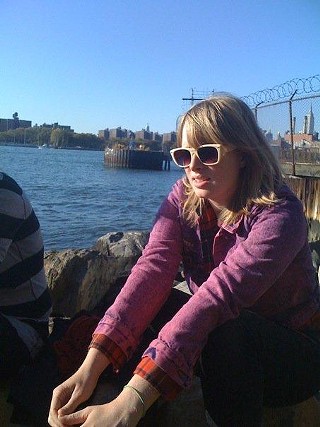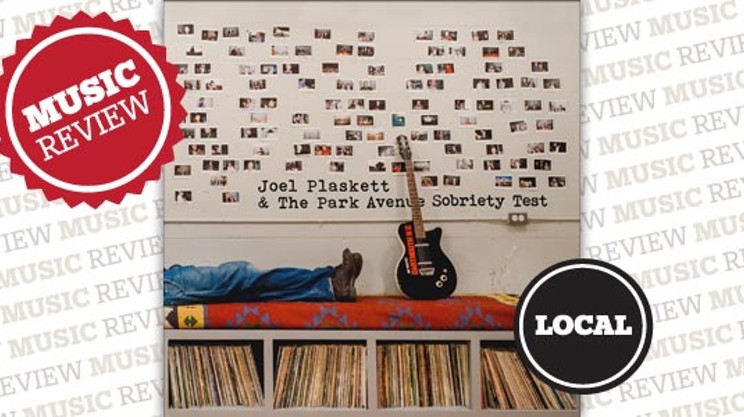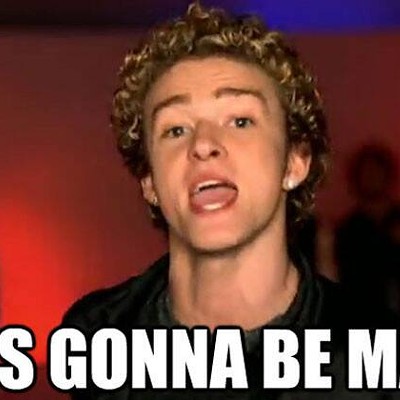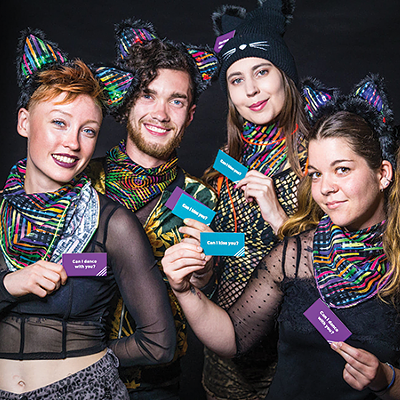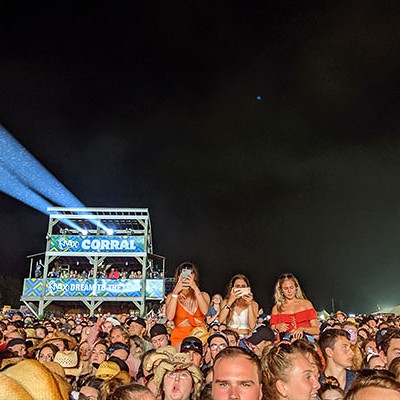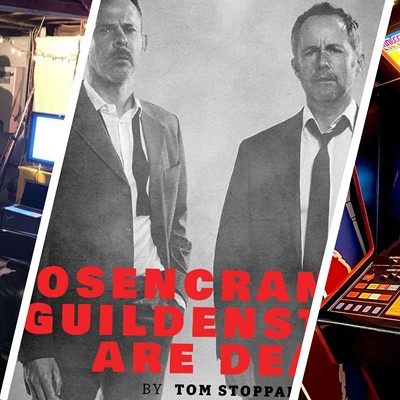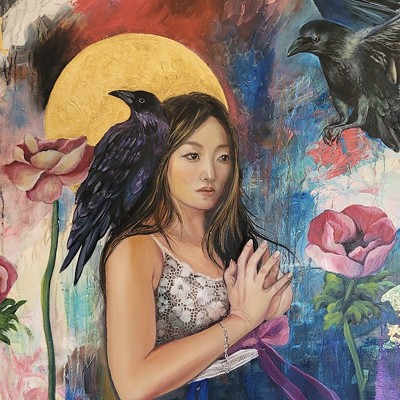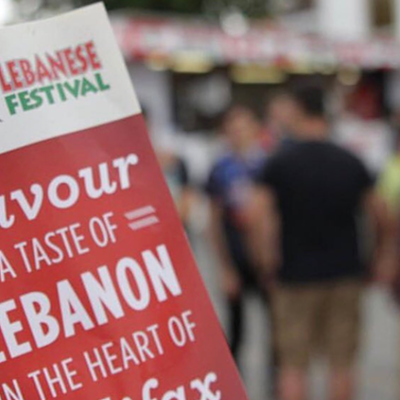Please, let's just kill the stereotype. Dash all thoughts from your mind of a lobster in a sou'ester playing a fiddle tune about a haunted bowl of chowder. East coast music---a world of styles beyond the tourist-friendly jigs and reels---has more than paid its dues, so let's move onwards and upwards. In honour of East Coast Music Week's 25th year, we held a wake for the tired caricature of Maritime musicians being a quaint group of fish-loving fiddlers and invited ECMW nominees Cam Smith, Ria Mae and Joel Plaskett to sit down together and have a chin wag about the history of the awards, what makes Halifax unique and where to go from here.
Joel Plaskett, nominated this year for fans' choice entertainer of the year and rock recording of the year for Scrappy Happiness, joked that he was "the establishment" of the group. It's true, 37-year-old Plaskett has been scrapping it out for 21 years, first in Thrush Hermit, a band that reigned over his "opinionated, indie 20-year-old years" and more recently as a Juno-winning artist.
Cam Smith, nominated for the African-Canadian recording of the year and rap/hip-hop recording for Ocean Blue, is the newest on the scene. These are Smith's first East Coast Music Awards nominations, and a much-deserved acknowledgement for two years of 100- percent-DIY, good old-fashioned elbow grease to get ahead.
Ria Mae is nominated for song of the year for "Leaving Today," her Classified-produced, criminally catchy single. Last year Mae had her first ECMA nomination in the best pop recording category for Under Your Skin, which, much to her own surprise, she won.
"Last year was the first year I was included, I feel like I'm in the 'club' now," says Mae, sitting at the table with Plaskett and Smith. "The year before that I asked everyone in the city if I could play anything at all and they were like, 'No.'"
"It's almost like a wake-up call," says Smith. "Once you've done patting yourself on the back you're like 'OK, people are paying attention. We need to get in gear and do something even better next year.' Since the nomination, a lot of people have called me. It showed them who I am but now I have to really prove who I am."
"If I go back in time, the ECMAs were fairly new around the time the Hermit got going around '93, when all that record label interest came, those were some of the first ECMAs that were being hosted at the Flamingo," says Plaskett. "We were playing a showcase with Sloan. It's a little blurry for me, stuff was going on and I didn't feel a part of it. At the time they were more focussed on Celtic music and the rock stuff was just creeping in. Sloan sort of swayed that, there was all this excitement about them, when previously it was all about Natalie, Ashley and the Rankins---deservedly so."
"That's like hip-hop now," says Mae. "It's just starting to be represented."
"I don't have management or anything behind me," says Smith. "I've been doing everything by myself for two years and it's been a huge learning curve to understand everything behind the music---the emails, the phone calls. I don't think everybody gets that, especially in the internet age when someone can upload a song and it becomes popular, they think it's all you have to do."
"And part of it is the organization behind you bringing you into the fold," says Plaskett, who counts manager Sheri Jones as a major factor. "The musicians provide the reason for the week but the business is a big part of the background story."
"I have musician friends, far more talented than me," says Mae, "and I tell them they need to seek out management. They're better than me, but I just get it. I get what you're supposed to do. It's a different ballgame than people think."
"You have to realize you can be on either side of the fence looking in or out, and I recognize that because I've been on both," says Plaskett. "So I remind myself of that when it seems like schmoozefest, or you have to do something that doesn't seem natural, like, 'Why do I have to do this weird showcase in a hotel room that's going to make me feel awkward?' Try and navigate it authentically ---it feels awkward to me but maybe to other people it's not. Onstage you're like 'Everyone is talking,' but they could be talking about you."
No one in the group shies away from hard work, and the conversation gradually shifted to what's coming up next. "The grind always continues," says Smith. "I'm looking to do a really solid project and to get more in involved on the industry side of things. I've never gotten a grant, and I'd love to. I feel like at some point, maybe not right away, I'd like a nomination outside of being stuck in the hip-hop circle. I'd love to win a songwriter nomination"
Mae's next focus is on production, pointing out that women are woefully underrepresented not only locally, but nationally, on the other side of the mixing board. "I've been teaching myself production. I've noticed there are no female producers that I know on the east coast, and if there is I'd love to meet one. [To Joel] I really look up to your career and I work with Classified and I really look up to his career too, I don't know if this is why you've started producing yourselves but there's such a disconnect with your art and what gets heard. Maybe there are female musicians who can't communicate as well with a male producer, but that's my goal--- after this Classified album I want my next album to be my own."
Plaskett's Scrappy Happiness featured his favoured DIY approach, connecting with fans through video blogs featuring intimate peeks into the recording process. "Ultimately for me it felt like a kind of natural progression," says Plaskett. "I've always found I prefer DIY. If you're not concerned about being a rock star then bringing people closer gives people an appreciation for what you do. But it doesn't work for everyone, I mean you don't see Rick White on Twitter. I mean, I wish! But nowadays it's part of the business at hand, right on up through the top levels of the music industry."
That said, learning to adapt to changing times wasn't the hardest lesson they'd worked on either.
"I had to stop comparing myself to other people, I got stuck there," says Mae. "I had to go through people saying I sucked a few times, which I actually enjoyed because on the east coast we're so nice. Each time I had that happen it was at hip-hop shows, it's great because hip-hop fans don't hold back. I had a girl come up and tell me I sucked---twice! She came over and said, 'You messed up and you suck' and I was like, 'I don't think I suck' and then she was like, 'You know what? I don't think you heard me, you suck!' I was like, 'Alright, thank you!'"
"For me a big lesson was depend on yourself, no one else is going to do it for you," says Smith. "If I want this to work then I have to learn how to do it. If I want to edit a video then I have to learn how to do that. I think that's the thing that really sets people apart."
And because we can't fully say goodbye to any lingering east coast music cliches without first recognizing the roots, the discussion turned to our city. Plaskett mentions some bang-on reasons why bars struggle amidst such an apparently strong scene. "It's a hilly city, we don't have great transit, it's a harsh climate, it's expensive, it's a university town and students drive the rent up," he says.
"Do you think Halifax is in a bubble compared to other parts of Canada?" asks Rae.
"We are, but I think it's a good bubble and people are jealous of it," says Plaskett. "We support each other. When I go to Calgary, Nova Scotian flags fall down from the balcony. It's sequestered, yeah, but it's super-healthy in terms of the brain trust, but the money...you walk down the street in Toronto and you see one cool record store and then a block later there's another one specializing in jazz. And here we are trying to keep the one place open."
"There's not even a bar for the hip-hop scene," says Mae.
"At least live music is part of the equation," says Plaskett. "Just going out and paying for it is the thing.
And maybe that is the heart of what's so valuable about an event like East Coast Music Week.
"The ECMAs seem like a mystery to people who aren't involved, but once you get into it, it's a place to hang your hat---a reason for everyone to get together," says Plaskett. "What it represents in terms of bringing a bunch of scenes together is really cool."
Crib notes ECMW = East Coast Music Week. Newly named to represent a week full of showcases, an industry conference and awards gala. ECMA = East Coast Music Awards or East Coast Music Association. ex: “I can’t believe I won an ECMA here at ECMW! I’d like to thank the East Coast Music Association and my dear mother.”


